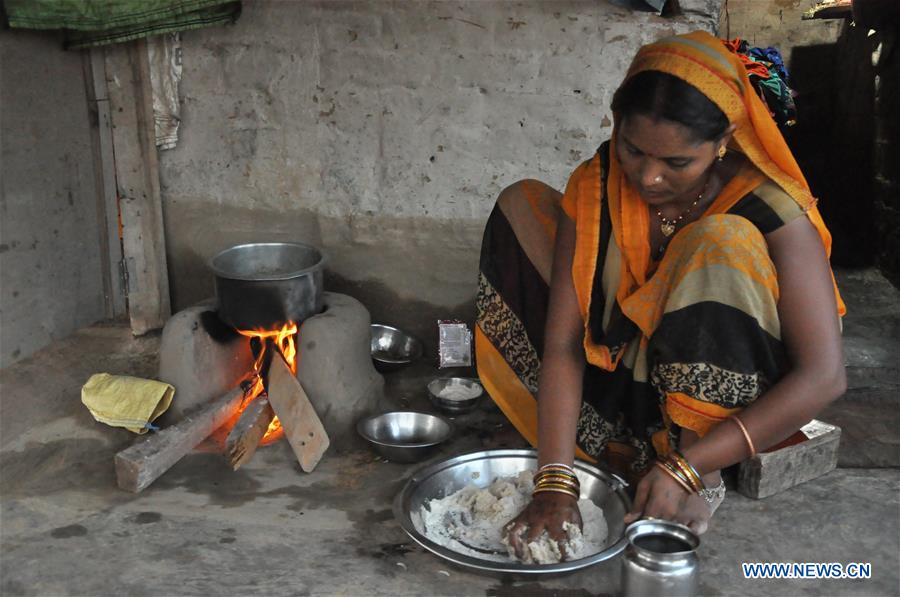
Mamta prepares dinner at home in Gurugram, a satellite town in northern state Haryana, India, July 26, 2020. (Str/Xinhua)
by Pankaj Yadav
NEW DELHI, July 27 (Xinhua) -- During the lockdown imposed to check the spread of the COVID-19 pandemic, beginning March 25, India witnessed a mass exodus of laborers from major cities, including the four metropolitan cities, Delhi, Mumbai, Chennai and Kolkata, besides other emerging cities to their native places.
These laborers belonged to mainly seven states of Bihar, Jharkhand, Madhya Pradesh, Rajasthan, Uttar Pradesh, West Bengal and Odisha.
While most of them worked as construction laborers, others were involved in farming activities or depended on their skills and worked as plumbers, gardeners, electricians, drivers, or cooks at homes or restaurants.
Once Prime Minister Narendra Modi announced the lockdown on the evening of March 24, over 90 percent of these panic-stricken laborers decided to move towards their villages located in remote and backward areas.
With no transport available, they walked distances as long as 1,500 km, to finally reach their respective destinations.
However, some among them decided to stay put at their workplaces. They got easy temporary works to make a few quick bucks even as the major cities faced acute shortage of labor during the lockdown period.
Manoj Raikwar, 28, a laborer from the Teekamgarh district of central state of Madhya Pradesh, is a construction worker in Gurugram, a satellite town in northern state Haryana, bordering the national capital New Delhi.
He lives with his wife Mamta, 27, in a small slum near village Wazirabad in Gurugram's Sector 52.
Living in a shanty along with his wife, he spoke with Xinhua to share his experiences during the COVID-19 lockdown.
"When there was uncertainty all around after the evening of March 24, we too panicked. Then we were living here with our four children. All construction activities had stopped and we were rendered jobless. Unable to decide, we waited and watched the evolving situation. After a couple of days, the nearby villagers started providing basic food items to the poor like us. And, soon, more help started pouring in, including cooked food," he told Xinhua.
He further stated that though he had lost his regular job at the nearby construction site, he soon got another part-time job as a watchman at a nearby built-up house offering lodging and hostel facilities.
"After nearly a week since the announcement of lockdown, with God's grace I started working again and earned handsomely. I stood as a watchman for a nearby house. Faced with high degree of uncertainty, I and my wife decided to send our four children to our native place so that they were safe in the hands of my parents," he said.
While cooking the evening meal, his wife Mamta said that they received enough food material, both raw and cooked, from the nearby villagers as well as from the state government.
"It was a tough time for everyone, and for us too, as none of us had seen such a situation ever before in our lives. We managed to send our kids to our village, and we both decided to spend time here only as my husband got a new temporary job as a watchman. Simultaneously, we were getting free food too," she said.
According to Mamta, very few laborers had decided to stay back. Maybe some couldn't get proper transport to go back to their native places as trains, buses and all other means of transport were stopped.
"Now, our kids continue to live in our village with their grand-parents. As construction activity has begun here once again, we got our regular job back and both of us work all day at the nearby construction site to earn a living. Though our personal life is back to normal, we miss our children at times," added Mamta.
Subhash Yadav, a resident of adjoining Wazirabad village, said he had rented out nearly 20 shanties to laborer-families. Immediately after lockdown, most of them started leaving for their respective native places. Only one or two families decided to stay back here.
"Those who went away haven't returned yet. We tried our best to provide dry food packets to those who spent the lockdown period here and even waived off rent for three months," he said, adding, "I had also rented out 10 shops to some who did small-time works like barbers, carpenters, selling groceries or vegetables/fruits etc. But they also shut the shops and went back to their villages. They haven't come back yet," Yadav said.
He believes that though the economic activities have re-started as the country is passing through Unlock 2 phase, but overall demand in the country's economy hasn't picked up yet, and it might take quite some time.
Guidelines for Unlock 3 are expected to be announced anytime soon. It is anticipated that gymnasiums and cinema-halls would be allowed to reopen though with restrictions to ensure social distancing.
"With jobs and salaries cut, the offices and factories aren't working at their optimum capacities. And, then, the government has extended connectivity norms for work from home for Information Technology (IT) companies till December 31 from July 31. So, most of the IT executives who used to live here, are opting to stay at their native places performing their professional duties from home. So, demand for daily use products hasn't yet risen to the pre-lockdown levels," said Yadav.
According to him, the situation would fully normalize to the pre-lockdown level only after this year-end.